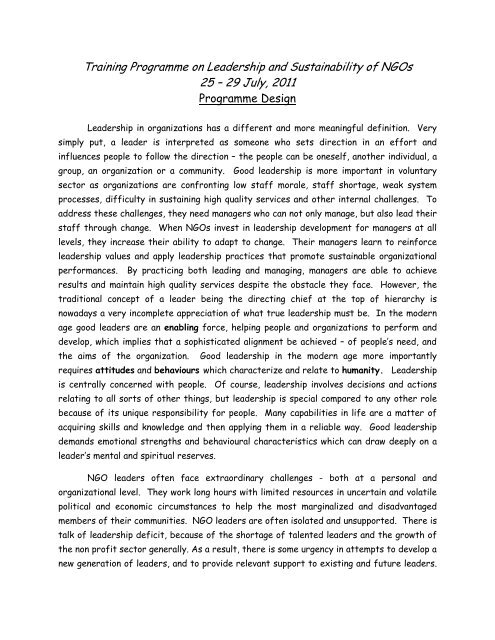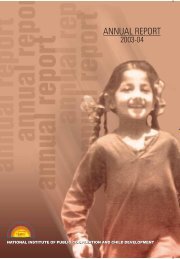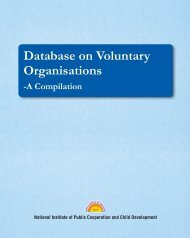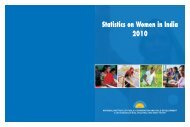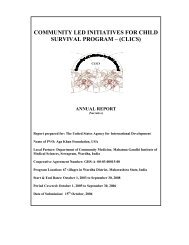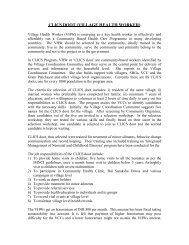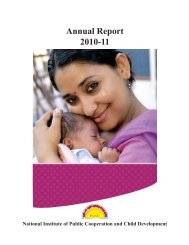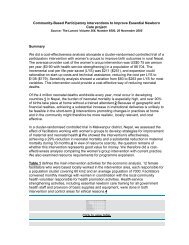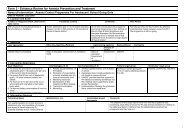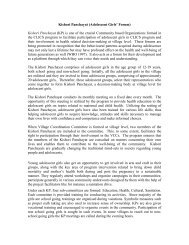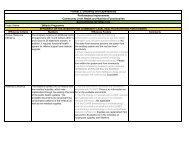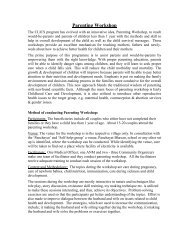Training Programme on Leadership and Sustainability of ... - Nipccd
Training Programme on Leadership and Sustainability of ... - Nipccd
Training Programme on Leadership and Sustainability of ... - Nipccd
You also want an ePaper? Increase the reach of your titles
YUMPU automatically turns print PDFs into web optimized ePapers that Google loves.
<str<strong>on</strong>g>Training</str<strong>on</strong>g> <str<strong>on</strong>g>Programme</str<strong>on</strong>g> <strong>on</strong> <strong>Leadership</strong> <strong>and</strong> <strong>Sustainability</strong> <strong>of</strong> NGOs<br />
25 – 29 July, 2011<br />
<str<strong>on</strong>g>Programme</str<strong>on</strong>g> Design<br />
<strong>Leadership</strong> in organizati<strong>on</strong>s has a different <strong>and</strong> more meaningful definiti<strong>on</strong>. Very<br />
simply put, a leader is interpreted as some<strong>on</strong>e who sets directi<strong>on</strong> in an effort <strong>and</strong><br />
influences people to follow the directi<strong>on</strong> – the people can be <strong>on</strong>eself, another individual, a<br />
group, an organizati<strong>on</strong> or a community. Good leadership is more important in voluntary<br />
sector as organizati<strong>on</strong>s are c<strong>on</strong>fr<strong>on</strong>ting low staff morale, staff shortage, weak system<br />
processes, difficulty in sustaining high quality services <strong>and</strong> other internal challenges. To<br />
address these challenges, they need managers who can not <strong>on</strong>ly manage, but also lead their<br />
staff through change. When NGOs invest in leadership development for managers at all<br />
levels, they increase their ability to adapt to change. Their managers learn to reinforce<br />
leadership values <strong>and</strong> apply leadership practices that promote sustainable organizati<strong>on</strong>al<br />
performances. By practicing both leading <strong>and</strong> managing, managers are able to achieve<br />
results <strong>and</strong> maintain high quality services despite the obstacle they face. However, the<br />
traditi<strong>on</strong>al c<strong>on</strong>cept <strong>of</strong> a leader being the directing chief at the top <strong>of</strong> hierarchy is<br />
nowadays a very incomplete appreciati<strong>on</strong> <strong>of</strong> what true leadership must be. In the modern<br />
age good leaders are an enabling force, helping people <strong>and</strong> organizati<strong>on</strong>s to perform <strong>and</strong><br />
develop, which implies that a sophisticated alignment be achieved – <strong>of</strong> people’s need, <strong>and</strong><br />
the aims <strong>of</strong> the organizati<strong>on</strong>. Good leadership in the modern age more importantly<br />
requires attitudes <strong>and</strong> behaviours which characterize <strong>and</strong> relate to humanity. <strong>Leadership</strong><br />
is centrally c<strong>on</strong>cerned with people. Of course, leadership involves decisi<strong>on</strong>s <strong>and</strong> acti<strong>on</strong>s<br />
relating to all sorts <strong>of</strong> other things, but leadership is special compared to any other role<br />
because <strong>of</strong> its unique resp<strong>on</strong>sibility for people. Many capabilities in life are a matter <strong>of</strong><br />
acquiring skills <strong>and</strong> knowledge <strong>and</strong> then applying them in a reliable way. Good leadership<br />
dem<strong>and</strong>s emoti<strong>on</strong>al strengths <strong>and</strong> behavioural characteristics which can draw deeply <strong>on</strong> a<br />
leader’s mental <strong>and</strong> spiritual reserves.<br />
NGO leaders <strong>of</strong>ten face extraordinary challenges - both at a pers<strong>on</strong>al <strong>and</strong><br />
organizati<strong>on</strong>al level. They work l<strong>on</strong>g hours with limited resources in uncertain <strong>and</strong> volatile<br />
political <strong>and</strong> ec<strong>on</strong>omic circumstances to help the most marginalized <strong>and</strong> disadvantaged<br />
members <strong>of</strong> their communities. NGO leaders are <strong>of</strong>ten isolated <strong>and</strong> unsupported. There is<br />
talk <strong>of</strong> leadership deficit, because <strong>of</strong> the shortage <strong>of</strong> talented leaders <strong>and</strong> the growth <strong>of</strong><br />
the n<strong>on</strong> pr<strong>of</strong>it sector generally. As a result, there is some urgency in attempts to develop a<br />
new generati<strong>on</strong> <strong>of</strong> leaders, <strong>and</strong> to provide relevant support to existing <strong>and</strong> future leaders.
Keeping this in view, NIPCCD Headquarters propose to organize a five day training<br />
programme entitled “<str<strong>on</strong>g>Training</str<strong>on</strong>g> <str<strong>on</strong>g>Programme</str<strong>on</strong>g> <strong>on</strong> <strong>Leadership</strong> <strong>and</strong> <strong>Sustainability</strong> <strong>of</strong> NGOs”<br />
from 25 – 29 July, 2011.<br />
Objectives: The objectives <strong>of</strong> the programme are to:<br />
i) acquaint the participants about the key abilities <strong>of</strong> NGOs <strong>and</strong> orient them about<br />
balance leadership <strong>and</strong> management;<br />
ii) make them underst<strong>and</strong> the organizati<strong>on</strong>al competencies critical for the NGO’s<br />
ability to deliver its missi<strong>on</strong> <strong>and</strong> be sustainable; <strong>and</strong><br />
iii) develop their leadership skills at pers<strong>on</strong>al <strong>and</strong> organizati<strong>on</strong>al level, <strong>and</strong> also help<br />
them to learn how to prioritise different leadership styles.<br />
Course C<strong>on</strong>tent: The course c<strong>on</strong>tents would broadly include topics like <strong>Leadership</strong> Skills<br />
at Pers<strong>on</strong>al <strong>and</strong> Organizati<strong>on</strong>al Level, Management Capacity, Support <strong>and</strong> Partnership,<br />
Evolving Accountability <strong>of</strong> NGOs, Capacity Building <strong>of</strong> Voluntary Sector, <strong>and</strong> Evaluating<br />
NGO Performance etc.<br />
Participants: About 30-35 participants from Nati<strong>on</strong>al <strong>and</strong> State Level voluntary<br />
Organisati<strong>on</strong>s comprising senior <strong>and</strong> middle level representatives would attend the<br />
programme.<br />
Methodology: The c<strong>on</strong>tents <strong>of</strong> the course would be covered through a combinati<strong>on</strong> <strong>of</strong><br />
training methods including lecture-cum-discussi<strong>on</strong>s; group discussi<strong>on</strong>s; case study analysis;<br />
group exercises; films etc., with emphasis <strong>on</strong> participatory approach to learning.<br />
Course Faculty: Besides faculty <strong>of</strong> the Institute, the course faculty would comprise<br />
subject matter experts from academic <strong>and</strong> technical instituti<strong>on</strong>s, government <strong>and</strong> n<strong>on</strong>-<br />
governmental organisati<strong>on</strong>s working in the field <strong>of</strong> voluntary sector.<br />
Background Material: Background material comprising <strong>of</strong> compendium <strong>of</strong> reading<br />
material, h<strong>and</strong>outs <strong>and</strong> other informative material would be distributed to the participants<br />
during the course to supplement the classroom discussi<strong>on</strong>s.<br />
Venue <strong>and</strong> Durati<strong>on</strong>: The durati<strong>on</strong> <strong>of</strong> the course will be for five days from 25 – 29 July,<br />
2011. It will be organised at the premises <strong>of</strong> the Nati<strong>on</strong>al Institute <strong>of</strong> Public Cooperati<strong>on</strong>
<strong>and</strong> Child Development (NIPCCD) located at 5, Siri Instituti<strong>on</strong>al Area, Hauz Khas,<br />
(opposite Police Stati<strong>on</strong> Hauz Khas) New Delhi-110016.<br />
Course Fee: The Institute will charge a token Registrati<strong>on</strong> Fee <strong>of</strong> Rs. 500/- (Rupees<br />
five hundred <strong>on</strong>ly) from all the participants at the time <strong>of</strong> Registrati<strong>on</strong>. That includes a<br />
n<strong>on</strong> – refundable processing fee <strong>of</strong> Rs. 50/- (Rupees Fifty <strong>on</strong>ly) al<strong>on</strong>g with the<br />
Nominati<strong>on</strong> Performa.<br />
Course Evaluati<strong>on</strong>: The participants would be required to evaluate the course <strong>on</strong><br />
parameters like course c<strong>on</strong>tent, durati<strong>on</strong>, skills <strong>of</strong> trainers <strong>and</strong> facilitators, training methods<br />
<strong>and</strong> extent <strong>of</strong> fulfillment <strong>of</strong> objectives <strong>of</strong> the course. The informati<strong>on</strong> elicited would help<br />
planning, designing <strong>and</strong> c<strong>on</strong>ducting future programmes.<br />
Travel, Board <strong>and</strong> Lodging:<br />
*The outstati<strong>on</strong> participants attending training course will be paid travel grant equivalent to<br />
AC III tier rail/actual bus fare (including reservati<strong>on</strong> charges) by shortest route to <strong>and</strong><br />
from Delhi excluding Shatabdi <strong>and</strong> Rajdhani Express. The journey by road to the nearest<br />
railway stati<strong>on</strong>/bus stati<strong>on</strong> will be paid to the n<strong>on</strong>-<strong>of</strong>ficial participants <strong>on</strong> the basis <strong>of</strong><br />
expenditure incurred subject to a limit <strong>of</strong> Rs.300/- each way.<br />
*Local participants will be paid actual expenditure incurred <strong>on</strong> local c<strong>on</strong>veyance subject to a<br />
limit <strong>of</strong> Rs.100/- per day.<br />
*The Institute will arrange board <strong>and</strong> lodging <strong>of</strong> all outstati<strong>on</strong> participants at its hostel<br />
located in the campus. The hostel accommodati<strong>on</strong> will be available to the participants <strong>on</strong>ly<br />
for the durati<strong>on</strong> <strong>of</strong> the course <strong>and</strong> a day before <strong>and</strong> a day after the course i.e. from 24 – 30<br />
July, 2011.<br />
General Instructi<strong>on</strong>s<br />
i. The enclosed nominati<strong>on</strong> form duly filled <strong>and</strong> sp<strong>on</strong>sored by the competent authority<br />
<strong>of</strong> the voluntary organizati<strong>on</strong> should reach the Institute latest by 24 June, 2011.<br />
A n<strong>on</strong> – refundable processing fee <strong>of</strong> Rs. 50/- (Rupees Fifty <strong>on</strong>ly) may be enclosed<br />
al<strong>on</strong>g with the Nominati<strong>on</strong> Performa (without which nominati<strong>on</strong> will not be<br />
c<strong>on</strong>sidered) in the form <strong>of</strong> Dem<strong>and</strong> Draft (drawn <strong>on</strong> a Scheduled Bank) in favour <strong>of</strong><br />
Director, NIPCCD, payable at New Delhi. Please note that nominati<strong>on</strong> would be
c<strong>on</strong>sidered <strong>on</strong> first-come-first-serve basis as well as <strong>on</strong> fulfilling eligibility criteria<br />
for the training programme.<br />
ii. The Institute will c<strong>on</strong>firm the participati<strong>on</strong> <strong>on</strong> receipt <strong>of</strong> nominati<strong>on</strong>s.<br />
The participants will proceed for participati<strong>on</strong> in the programme <strong>on</strong>ly <strong>on</strong><br />
receiving a c<strong>on</strong>firmati<strong>on</strong> from the Institute. Participants are requested to<br />
c<strong>on</strong>firm the acceptance <strong>of</strong> their nominati<strong>on</strong>s over teleph<strong>on</strong>e/e-mail before<br />
proceeding for the training programme in case <strong>of</strong> n<strong>on</strong>-receipt <strong>of</strong> c<strong>on</strong>firmati<strong>on</strong><br />
letter at their end.<br />
iii. Participants should report for the programme at 9.00 a.m. <strong>on</strong> 25 July, 2011.<br />
iv. Participants reporting late for the programme or leaving it before the c<strong>on</strong>cluding<br />
sessi<strong>on</strong> would not be entitled for any Certificate or reimbursement <strong>of</strong> travel<br />
expenses.<br />
C<strong>on</strong>tact Details<br />
All related corresp<strong>on</strong>dence regarding the <str<strong>on</strong>g>Programme</str<strong>on</strong>g> should be addressed to:<br />
Dr. Ashok Kumar<br />
Joint Director (PC)<br />
Or<br />
Dr. S.C. Joshi<br />
Assistant Director <strong>and</strong> <str<strong>on</strong>g>Programme</str<strong>on</strong>g> Incharge<br />
Nati<strong>on</strong>al Institute <strong>of</strong> Public Cooperati<strong>on</strong> & Child Development<br />
5, Siri Instituti<strong>on</strong>al Area, Hauz Khas, New Delhi-110016<br />
Ph<strong>on</strong>e: (011) 26534014, Fax: 011- 26966329, Gram: NIPCHILD,<br />
Email: drsharatjoshi@yahoo.in<br />
sdck17@gmail.com


